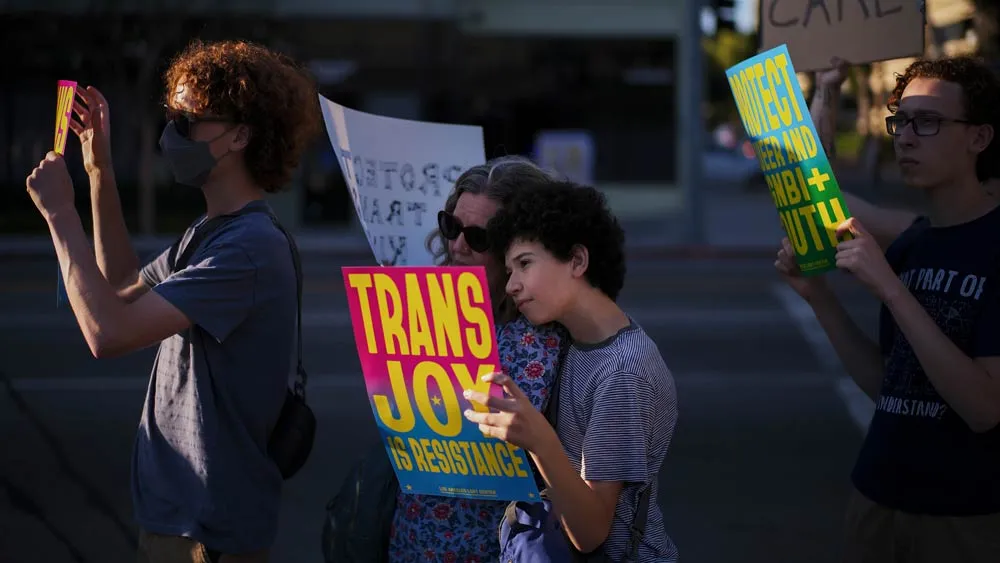November 7, 2023
Who was Muhlaysia Booker? Here's what to Know after the Man Accused of Killing her Pleaded Guilty
Jamie Stengle READ TIME: 4 MIN.
A man charged in the 2019 fatal shooting of a transgender Dallas woman about a month after she was beaten in a separate attack that was caught on video was sentenced Monday to 48 years in prison.
Kendrell Lyles, 37, entered a guilty plea to murder as jury selection was set to begin in his trial in the death of 22-year-old Muhlaysia Booker.
Booker had been shaken but resolute when she spoke at a rally held for her after several men beat her following a minor traffic accident. She told supporters then: "This time, I can stand before you, whereas in other scenarios, we are at a memorial."
The violence that befell Booker in her short life exemplifies threats faced by transgender people, and especially Black transgender women, across the U.S. Booker told police that the people who attacked her after the traffic accident used homophobic slurs. Authorities haven't publicly revealed a motive for her killing but have said it was unrelated to the earlier assault.
Texas is among states where transgender people have been targeted with a growing number of laws and policies, including restrictions on gender-affirming care, public bathroom use and participation in sports.
Here's what to know about Booker's killing:
WHAT HAVE POLICE SAID?
Booker's body was found the morning of May 18, 2019, on a Dallas street.
Police said they identified Lyles as the suspect while investigating the deaths of a man and woman who were killed in separate shootings in the days after Booker's slaying. Lyles also has been charged in the deaths of those two victims, neither of whom were transgender, according to police.
Booker got into a vehicle matching the description of one Lyles drove about three hours before her body was found, an arrest warrant said. A witness told investigators that Lyles frequented the area to meet with transgender sex workers, according to the warrant. Her body was found a few miles from where she had gotten into the vehicle.
Investigators also found that Lyles' and Booker's phones were traveling together around the time she was killed, and he had her phone in his possession after her slaying, the arrest warrant said.
Lyles' attorney, Richard Franklin, said after his client entered the guilty plea that it "was the right result." Franklin said he did not know the motive for the slaying.
WHAT HAPPENED AFTER BOOKER'S CAR ACCIDENT?
Cellphone video of Booker being beaten was shared widely on social media.
Following the April 12, 2019, car accident, a crowd gathered and watched as several men attacked Booker. Eventually, a group of women carried Booker's limp body to safety, and she was hospitalized with her injuries.
Edward Thomas was convicted by a jury of misdemeanor assault in the attack and was sentenced to 300 days in jail, including time served.
HOW DO THOSE WHO KNEW BOOKER DESCRIBE HER?
Naomi Green was working as the program manager of transgender services at Abounding Prosperity Inc. when she met Booker as the group planned the rally to support Booker following the attack. Green said Booker had "a big, big personality" and a knack for humor.
"She was this towering personality and full of life and energy," Green said. "I could tell that even though she had gone through what she had gone through, she wasn't broken."
Green said that Booker's death was devastating, and also symbolic of "how many of us within the community deal with acts of violence multiple times throughout our lives."
WHAT ARE PEOPLE SAYING AFTER THE PLEA IN THE CASE?
Stephanie Houston, Booker's mother, said: "No amount of time can bring Muhlaysia back, and although we wish the sentence was capital punishment, our family can finally have some sense of closure knowing that justice was served and he can't cause any more families hurt and pain."
Ahmad Goree, board president for the Muhlaysia Booker Foundation, which Houston started after her daughter's death to help transgender people, thanked police and the district attorney's office.
"We hope this sentence sends a message that trans lives matter and those who decide to do this community harm will face justice," Goree said.
WHAT ARE THE STATISTICS ON VIOLENCE AGAINST TRANSGENDER PEOPLE?
Tori Cooper, director of community engagement for the Human Rights Campaign's Transgender Justice Initiative, said she hopes Booker's story helps shine a light on violence against transgender people. "This is just one of hundreds of cases that we've reported on over the years – and those are just the cases that we know about," Cooper said.
Since 2013, the HRC's public education and research team has identified at least 334 transgender and gender-nonconforming people killed by violence across the U.S. Of those, 75% have been transgender women of color and almost 62% have been Black transgender women. And, HRC said, almost 10% of those killings happened in Texas – more than any other state.
WHAT ABOUT THE OTHER SLAYINGS?
Lyles is charged with two additional murder counts in neighboring Collin County in the shootings of 35-year-old Leticia Grant on May 22, 2019, and 29-year-old Kenneth Cichocki, on May 23, 2019. Authorities have not revealed his motive in their slayings. Franklin, Lyles' attorney, said Monday that he had no comment on those cases.


